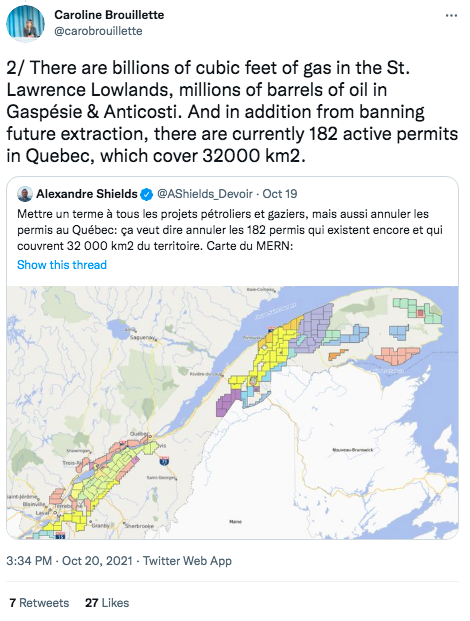The field of candidates is admittedly packed and, even in the U.S., Donald Trump eclipsed the Senate for a few years, but over the longer haul, senators have done the greater damage to our species’ prospects.
American senators have been doing the bidding of their fossil financiers since well before Kyoto, quashing any prospect of global leadership from the one country that might have provided it.
And now, two Democratic senators appear to have scuttled U.S. President Joe Biden’s big climate plan, right before the next climate summit.
The centrepiece of the plan was a serious program to clean up the U.S. electricity grid — a sprawling network of power lines and plants that spews out more climate pollution than all global aviation. More than all but seven countries. And beyond its own climate impact, cleaning the grid is the crucial step in decarbonizing most everything else in the switch from fossil fuels to electricity.
The obstructionism of the two senators has grave implications for international politics as well. We may smirk when our southern neighbours call themselves “the indispensable nation,” but there wouldn’t be a Paris Agreement without the interventions of Barack Obama and his shuttle diplomacy with China and India. Just a few months ago, countries were tripping over themselves to stay onside as the new Biden administration pushed aggressively towards COP26 in Glasgow next month.
Not all of the climate and energy aspects of Biden’s plan are being gutted. But it looks like it’ll be lots of carrots and no sticks. Barring a last-minute reversal by the two senators (Joe Manchin and co-obstructor Sen. Kyrsten Sinema), the backdrop to Glasgow will be that every country is fully aware the U.S. is not going to follow through on the targets and promises it has been cajoling others to copy.
One of the most galling moments came when Manchin subverted the whole concept of an energy “transition” to rationalize his obstruction: “The clean utility plan is $150 billion for what’s already transitioning. We’ve transitioned.”
Really?!? Eighty per cent of our energy comes from fossil fuels today. That’s exactly the same proportion as 10 years ago.
Beware the politician that starts a sentence with “it’s a transition.” They’re almost certainly about to defend something that’s not.
We hear it quite a lot in Canada, in defence of permitting new drilling or purchasing a pipeline.
In fact, just this week, we learned that fossil fuel production is set to soar over the next decade. Countries are planning to extract twice as much as we can “safely” burn if the world is to stay under 1.5 degrees of heating, according to the Production Gap report from the UN Environment Program.
Image from UNEP
Perhaps it’s inevitable that good concepts like energy transition get co-opted and misused. But it’s not a concept we should let slip, because a true transition is what we need, and we saw a bold step this week from Quebec.
Premier François Legault announced Quebec will “definitively renounce the extraction of hydrocarbons on its territory.”
Quebec joins a growing list of governments eschewing fossil fuel development. In last week’s newsletter, we looked at the moves by Denmark to stop all new licensing and wind down production. Spain, France, Greenland, Ireland, Belize and Costa Rica have all taken similar stands, as have subnational governments like California.
The move by Quebec was discounted in some quarters as painless because the province doesn’t currently have a significant oil and gas industry. But Quebec is actually making a stand here and leaving money on the table: unlike British Columbia, the government has already rejected proposals for a liquefied natural gas industry.
And there are 182 active exploration permits in Quebec.

Industry certainly doesn’t think Quebec’s definitive renunciation is painless. Companies are already suing the government for compensation.
Geneviève Paul, executive director of the Centre québécois du droit de l'environnement, tells me that “the Quebec legislature should not fear financial risk. It has all the necessary powers to adopt legislation that clearly bans all fossil fuel activities within the province, even retroactively, without spending public funds.”
Her organization has done the legal research and intervened in two of the lawsuits against the provincial government.
But this is likely to become a major issue as true transition plans take hold around the world and fossil fuel companies fight back, demanding buyouts.
So, let’s give Geneviève the last word and hope she’s right:
“When there’s political will, there’s a way. A way out of fossil fuel exploration and extraction, and a way out of litigation.”
The Roundup
First real test for feds
While the spotlight shines on big events like the UN climate summit, industry lobbyists know they can get a lot done in the shadows, defanging the actual regulations that turn law into action. That’s what’s happening to one of the Liberals’ core climate policies — the Clean Fuel Standard.
“The oil industry has successfully delayed and diluted the proposed regulation,” says Polaris Strategy’s Dan Woynillowicz, one of the sharpest climate policy analysts in the country.
“As currently designed, the regulations will deliver slightly cleaner fossil fuels... But three-quarters of the pollution in a barrel of oil comes from its end use. Unless strengthened, the Clean Fuel Standard won’t do as much as it could to deliver the clean fuels we need to displace fossil fuels altogether. And ultimately, that’s the ballgame."
The regulations have already gone through the first step in Canada’s regulatory process. So, there’s only a small window of opportunity to reverse the industry’s lobbying before the final stage.
Dan describes it as “the first real test of the (Liberal Party’s) commitment to up their game, not just in words but actions.”
Alberta’s paradoxes
Alberta is the home of the oilsands, but solar is growing faster than anywhere else in Canada, country music stars are battling coal mines, and old coal mines are being repurposed as pumped hydro facilities to back up renewable energy.
In the same week that both Calgary and Edmonton elected mayors advocating climate action, the provincial government released its… well, by this point you’ve probably heard about its bizarre, invidious “inquiry.” If you’re just catching up, check out: Sandy Garossino’s As Kenney's anti-Alberta Energy inquiry fizzles out, remember it was a grave abuse of power
Sandy has been doing heroic work on this awful inquiry for years. For example, Clear their names, Jason Kenney. And, her masterwork: A data-based dismantling of Jason Kenney's foreign-funding conspiracy theory
For more coverage of the inquiry, you might want to read John Woodside’s Alberta’s anti-energy inquiry turns out to be ‘a very expensive Google search’.
And Max Fawcett: Anti-Alberta energy inquiry is an outrageous 657-page "nothingburger"
880,000 Canadian jobs
If federal and provincial governments don’t get their act together on a true transition, hundreds of thousands of jobs are at risk, according to Sink or Swim, a new report from the Canadian Institute for Climate Choices.
"This transition is coming from factors outside of Canada's control. So really, it's all about what ... we do at all orders of government to prepare ourselves for that shift that is making its way to our shores no matter what," says the institute’s director of research, Dale Beugin.
Plastics worse than coal
Making plastic is often described as the oil industry’s “plan B” as the world moves beyond oil and gas. And the plastics industry is on track to cause more climate change than coal within the decade, according to a new report from Beyond Plastics.
“It's a problem that has received minimal attention from politicians and businesses. While some countries, including Canada, are starting to tackle plastic pollution, few have focused on the industry's climate impacts,” reports Marc Fawcett-Atkinson.
Coastal GasLink pipeline
Indigenous land and water defenders blocking the Coastal GasLink pipeline on Wet'suwet'en lands have launched a campaign to get investors to pull out of the project. The blockades were the catalyst for rail blockades across Canada in 2020. The new call for divestment is supported by over 100 organizations from around the world.
This level stink-eye from Molly Wickham might just get the message through.

Biomass gets the boot
Energy giant Drax got kicked off the S&P Global Clean Energy Index this week because the U.K. company is phasing out coal but burning wood (“biomass”) instead.
Canada is the world’s second largest exporter of wood pellets, and Drax recently bought the Canadian company Pinnacle, based in Prince George, B.C., to add to its global supply. Stand.earth and Conservation North have documented whole trees from B.C.’s inland rainforest getting trucked into pellet plants.
Shipping news
Amazon, Ikea and Unilever committed to switch their ocean freight to vessels powered by zero-carbon fuels. You might remember last week we looked at Maersk’s move toward container ships powered by methanol derived from green hydrogen.
The new group includes unexpected names like Michelin alongside the more predictable (Patagonia). The companies have set themselves a target date of 2040. The campaign coalition Ship It Zero described the commitment as “historic” but called on the companies to accelerate their timeline and abandon fossil shipping by 2030.
They Totally knew
The #ExxonKnew campaign has done a fantastic job publicizing the oil giant’s concerted efforts to muddy climate science and block action, all while the company itself fully understood the dire impacts of its product.
This week, the French company Total was exposed for the same kind of scurrility. Archival research shows the company had internally acknowledged its role in climate breakdown 50 years ago, but ran a co-ordinated strategy of public denial starting in the 1980s.
You might think these kinds of exposés are old news, but they’re important because they undermine Big Oil’s ability to sway the public and delay climate action, and also because they may have serious legal consequences. Lawsuits are already underway around the world based on the principle that big polluters are liable for knowingly causing damage to communities.
A big win in California
On Thursday, the Golden State announced a major win for climate justice advocates. It may be hard to believe, but oil drilling is still common right in California communities and neighbourhoods, with all the consequent health impacts you’d imagine (it’s worth checking out this video). The governor is restricting drilling within one kilometre of homes or schools, which could affect one-third of the state’s production.
Electricity v. gas, smackdown edition
One of the truly weird things about Canadian climate politics is how slow the electricity sector has been to seize its moment (with the notable exception of Hydro-Québec). But that slothfulness abruptly changed in B.C., where the electricity utility is suddenly taking the piss out of the gas company.

And we’re finally, finally seeing the utility make a full-on push for heat pumps, which give customers both heat and cooling. You can even get a T-shirt.
That’s all for this week. I’ll leave you with a plug for our new podcast. Episode 1 of Race Against Climate Change is about How We Eat. It includes a fascinating interview about indoor farming and delves into food security, this summer’s heat dome and justice for farmworkers.
Thank you for reading Zero Carbon. You can email me with your thoughts or suggestions for future newsletters at [email protected].
Support for this issue of Zero Carbon came from The Trottier Foundation and I-SEA.
Sources and Links
First real test
Reuters, Canada's clean energy lobby groups call for changes to draft Clean Fuel Standard
Dan Woynillowicz, Twitter thread
880,000 Canadian jobs
Canada’s National Observer, More than 880,000 Canadian jobs at stake as we transition to clean energy
Plastics
Rolling Stone, Jeff Goodell, Plastic May Soon Overtake Coal as a Climate Killer
Canada’s National Observer, Plastics are worse than coal for climate change. Does anyone care?
Biomass
The Narwhal, From forest to furnace: how the U.K.’s wood-pellet plants are driving logging in B.C.
The Guardian, Drax dropped from index of green energy firms amid biomass doubts
Stand.earth, Risky business: Canada props up wood pellet export as a false climate solution
Shipping news
Splash247, Amazon, Ikea and Unilever pledge zero emission shipping by 2040
Ship It Zero, Big Retail Fossil-Free Shipping Commitment Historic, But Too Weak
Total knew
Financial Times, Total accused of campaign to play down climate risk from fossil fuels
Study: Early warnings and emerging accountability: Total’s responses to global warming, 1971–2021
A big win in California
Office of the Governor of California, video



